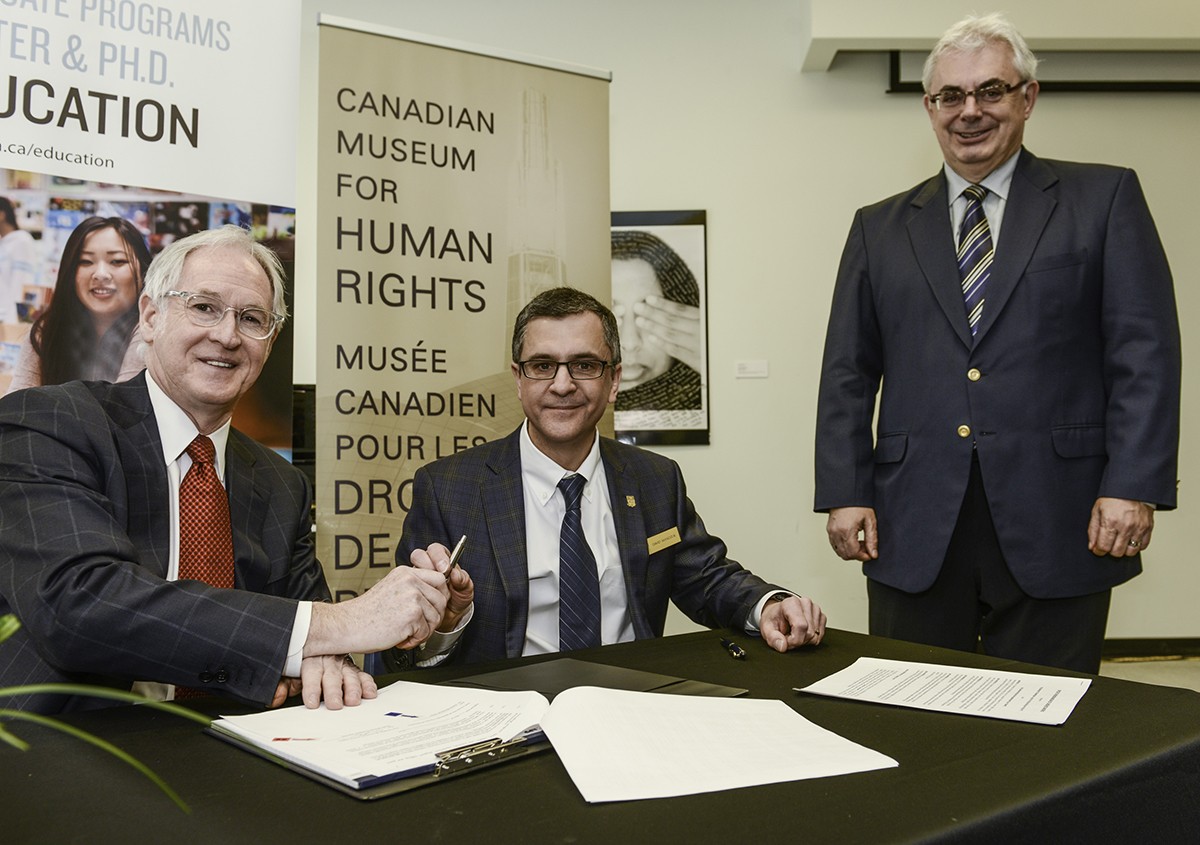
CMHR president and CEO Stuart Murray, Dean of Education David Mandzuk and President David Barnard. // Photo Mike Latschislaw
U of M connections: Canadian Museum for Human Rights
Canadians and Winnipeggers have a new point of pride after this weekend, which sees the opening of the long-anticipated Canadian Museum for Human Rights (CMHR) in Winnipeg.
When people around the globe think of human rights, they’ll think of Winnipeg — and they may just think of the University of Manitoba, too.
University of Manitoba researchers and scholars are excited to be a part of this new chapter in our city.
With a long-standing history of scholarship and research in this area, U of M faculty and staff have collaborated with the CMHR throughout its development. They’ve contributed to projects on a diverse range of topics, from Metis rights to the anti-apartheid movement to state terrorism in Argentina.
There are multiple other points of alliance between the museum and the U of M.
A close relationship exists between the CMHR and the U of M, highlighted by the museum’s partnership with the university’s Centre for Human Rights Research (CHRR), which was established in 2012.
The work of the CHRR currently focuses on the themes of sexual and reproductive rights, drinking water as a human right, documenting human rights, and truth and reconciliation related to Indian residential schools. Since its inception, 43 professors and 11 faculties have signed on as research affiliates.
Earlier this year, the U of M’s Centre for Professional and Applied Ethics partnered with the Canadian Museum for Human Rights and the CBC to bring some of the world’s preeminent human rights thinkers to Winnipeg for an original lecture series.
Under the leadership of Arthur Schafer, professor of philosophy and director of the centre, the lecture series explored the global struggle for human rights. It featured such notable speakers as Germaine Greer, A.C. Grayling, and Kwame Anthonly Appiah.
In celebrating the opening of the Canadian Museum for Human Rights, the U of M is also proud to recognize the outstanding leadership of our alumni whose tireless efforts have transformed a vision into a reality.
The museum is the result of the efforts of a number of people, in particular, Gail Asper [BA/81, LLB/84, LLD/08], whose dedication to this historic project is also a testament to her mother, Babs Asper [BA/54], and her father, Israel Asper [BA/53, LLB/57, LLM/64, LLD/98], a prominent alumnus and business leader whose initial vision to establish a museum dedicated to human rights in Winnipeg has made our city an international centre for human rights research, education and advocacy. Moe Levy [BComm(Hons)/73, MBA/74], a long-time colleague of Israel Asper, has been instrumental in building support for the museum across the country.
The university is home to the new National Research Centre on Residential Schools, which will house the archives of the Truth and Reconciliation Commission of Canada, including: thousands of video- and audio-recorded statements from survivors and others affected by the schools and their legacy; archival documents and photographs, works of art, artifacts and other expressions of reconciliation presented at TRC events.
The opening of the CMHR is also attracting top graduate students to the province, making Manitoba the premier destination for human rights research. In fact, the museum’s research department already includes two University of Manitoba graduates.
The connections don’t end there. Clinton Curle, the museum’s head of stakeholder relations and a professional affiliate of the U of M’s Robson Hall Law School, also serves on the advisory board for the university’s Canadian Journal of Human Rights, the only journal of human rights scholarship in Canada.
As it opens this weekend, the university supports the museum as it celebrates and promotes human rights at the national and international levels.
Human rights are essential to the establishment of a just, egalitarian and peaceful society. Let’s celebrate the work being done by University of Manitoba researchers and graduate students in collaboration with the Canadian Museum of Human Rights in helping to realize this vision.







The University of Manitoba Archives holds many archival collections relating to the development of Human Rights, including the rights of the LGBTTIQ community in Manitoba, women’s reproductive rights, marital rights, the right to die, and so on:
http://umanitoba.ca/libraries/units/archives/collections/subject/human_rights/index.html